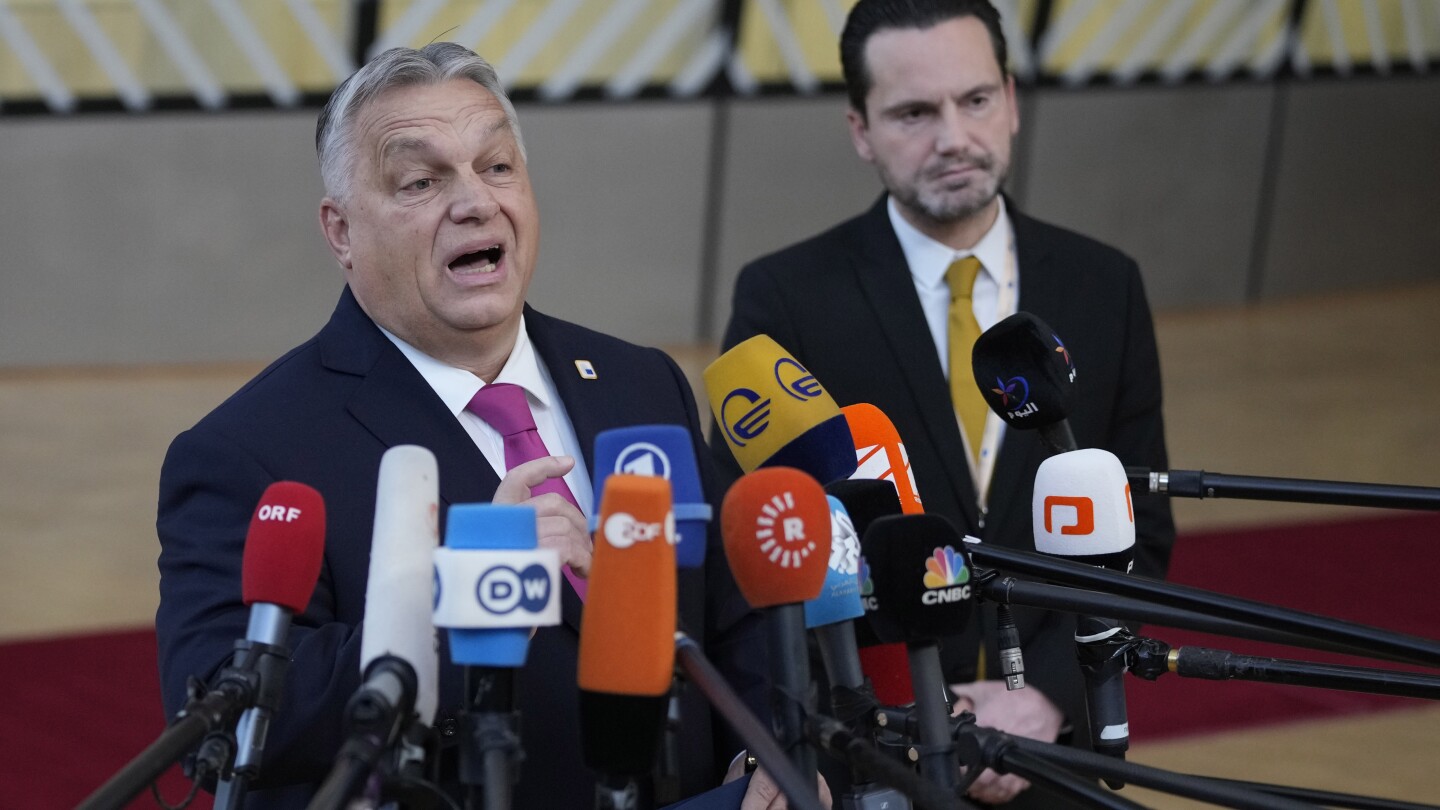BRUSSELS (AP) — European Union leaders struggled at the start of a two-day summit Thursday to keep their two most elementary promises to Ukraine at war intact — to give it the money and wherewithal to stave off the Russian invasion and maintain its hope that one day it will be able to join the wealthy bloc.
And stunningly, the threat to that commitment does not come from outside, but from within, from its increasingly recalcitrant member Hungary. The vision of its prime minister, Viktor Orban, heartily shaking hands with Russian President Vladimir Putin two months ago still hung heavy over the summit.
Orban came into the summit vowing to both block the plans by his 26 fellow leaders to officially declare that membership negotiations with Ukraine can start, and more pressingly, deny Kyiv 50 billion euros ($54 billion) in financial aid that the country dearly needs to stay afloat.
“The European Union is about to make a terrible mistake and they must be stopped — even if 26 of them want to do it, and we are the only ones against it,” he said in comments released by his office Thursday. “This is a mistake, we are destroying the European Union.”
The challenge comes at an especially dire time for Ukrainian President Volodymyr Zelenskyy, straight off a trip to Washington where his pleas for more aid from the U.S. Congress fell on deaf ears. He was widely expected to come to Brussels to make his case heard here too but there was no official confirmation early Thursday that he would attend.
“Ukraine will not stand without supports and ongoing support from both the European Union and the U.S,” said Irish Prime Minister Leo Varadkar. Barring that, he added “well then, Putin will win.”
Lithuanian President Gitanas Nauseda said the decision on the financial aid had to be taken at the summit, “because Ukraine is not fighting tomorrow. Ukraine is fighting right now.”
The urgency to find a solution is matched only by the potential blow to the EU’s credibility.
“Whatever it takes” had been the relentless mantra of the EU in pledging its support, leaders dressed up in the yellow and sky-blue colors of Ukraine, and countless speeches ending with the rallying cry “Slava Ukraini!” — “Glory to Ukraine!”
The EU, a group of 27 nations which still cherish their independence on strategic and foreign affairs issues, works by unanimity on most issues relating to Ukraine, and now Orban is seen by many as Putin’s foot in the summit door, Putin’s wrecking ball to demolish EU support for Zelenskyy.
Even ahead of the summit, French President Emmanuel Macron and German Chancellor Olaf Scholz had already taken Orban aside in an attempt to make him change his mind.
Orban said such tactics would not work. “We will not shift on this, no matter the offer. Hungarians are genetically insensitive to pressure,” he said. He said at least three conditions had not yet been fulfilled by Ukraine. “So there is no need to negotiate membership of Ukraine now.” The next EU summit is slated in March.
Orban has complained of corruption in Ukraine and has demanded a “strategic discussion” on the country’s future in Europe as the war with Russia bogs down and concerns mount about what kind of administration might emerge in Washington after the U.S. elections in a year.
Orban has been at odds with his fellow EU leaders for years, ranging from fights over COVID-19 recovery money to his declining respect for the Western democratic principles that are the essence of the EU. Yet as the longest-serving EU leader, he knows how to play the summit room like few others and has been able to extract financial concessions time and again to shore up his struggling economy.
It could come in handy over the next days.
“We should be clear, this is not a Hungarian bazaar where anything can be traded for something else. This is at a decisive moment, where we need to show that we continue to support Ukraine in full unity,” Belgian Prime Minister Alexander De Croo said.
The EU relented on Wednesday and granted Hungary access to over 10 billions euros ($11 billion) in funds that had been frozen by the European Commission out of concern that democratic backsliding by Orban could put the bloc’s principles at risk. The Commission said it did so after Budapest had made the necessary concessions on the rule of law principle and denied it was a bargaining chip.
If Orban still refuses to back the Ukraine aid, officials have said that the 26 member states could possibly sidestep the EU process and individually grant the money. The process would be unwieldy and more expensive but possible.
___
AP writers Lorne Cook in Brussels and Justin Spike in Budapest contributed.

